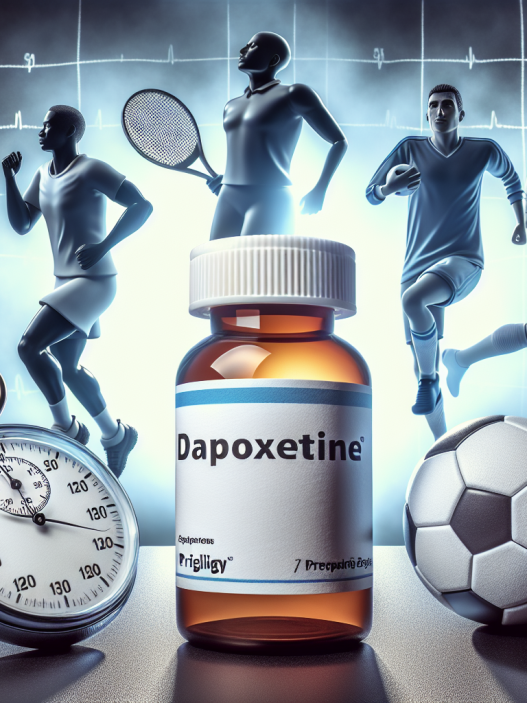-
Table of Contents
Letrozole’s Influence on Sports Performance
In the world of sports, athletes are constantly seeking ways to improve their performance and gain a competitive edge. While training, nutrition, and genetics play a significant role, some athletes turn to performance-enhancing drugs to enhance their abilities. One such drug that has gained attention in recent years is Letrozole, a medication primarily used to treat breast cancer in postmenopausal women. However, its use in sports has sparked controversy and raised questions about its influence on sports performance. In this article, we will explore the pharmacokinetics and pharmacodynamics of Letrozole and its potential impact on sports performance.
The Mechanism of Action of Letrozole
Letrozole belongs to a class of drugs known as aromatase inhibitors. Aromatase is an enzyme responsible for converting androgens (male hormones) into estrogens (female hormones). By inhibiting aromatase, Letrozole reduces the production of estrogen in the body. This mechanism is beneficial in treating hormone receptor-positive breast cancer, where estrogen fuels the growth of cancer cells. However, in the world of sports, Letrozole’s ability to lower estrogen levels has raised concerns about its potential performance-enhancing effects.
Pharmacokinetics of Letrozole
After oral administration, Letrozole is rapidly absorbed and reaches peak plasma concentrations within 2 hours. It has a bioavailability of approximately 99%, meaning that almost all of the drug reaches the systemic circulation. Letrozole is primarily metabolized in the liver by the enzyme CYP3A4 and is excreted in the urine and feces. Its half-life is approximately 2 days, and it takes about a week for the drug to be completely eliminated from the body.
Pharmacodynamics of Letrozole
The primary pharmacodynamic effect of Letrozole is its ability to inhibit aromatase and reduce estrogen levels. In postmenopausal women, Letrozole has been shown to decrease estrogen levels by up to 98%. This reduction in estrogen can have various effects on the body, including decreased bone density, increased risk of cardiovascular disease, and changes in lipid metabolism. However, in the world of sports, the most significant concern is the potential impact on muscle growth and performance.
Letrozole and Sports Performance
One of the main reasons athletes may turn to Letrozole is its potential to increase testosterone levels. Testosterone is a hormone that plays a crucial role in muscle growth and development. By inhibiting estrogen production, Letrozole can indirectly increase testosterone levels, leading to improved muscle mass and strength. However, the use of Letrozole in sports is considered doping and is prohibited by the World Anti-Doping Agency (WADA) and other sports organizations.
Moreover, Letrozole’s ability to reduce estrogen levels can also have other performance-enhancing effects. Estrogen is known to promote water retention and increase body fat, which can negatively impact an athlete’s performance. By lowering estrogen levels, Letrozole can help athletes achieve a leaner physique and improve their overall athletic performance.
Real-World Examples
The use of Letrozole in sports has been a topic of discussion in recent years, with several high-profile cases bringing it into the spotlight. In 2016, the International Olympic Committee (IOC) announced that four female weightlifters from Kazakhstan had tested positive for Letrozole during the 2012 London Olympics. The athletes were stripped of their medals and banned from competing for two years. Similarly, in 2019, a Russian boxer was disqualified from the European Games after testing positive for Letrozole. These cases highlight the prevalence of Letrozole use in sports and the potential consequences for athletes.
Expert Opinion
While the use of Letrozole in sports may seem appealing to some athletes, it is essential to consider the potential risks and side effects. The reduction of estrogen levels can have significant impacts on an athlete’s health, including increased risk of osteoporosis and cardiovascular disease. Moreover, the use of Letrozole is considered cheating and can result in severe consequences for athletes, including disqualification and bans from competition. As experts in the field of sports pharmacology, it is our responsibility to educate athletes about the potential risks and consequences of using Letrozole for performance enhancement.
Conclusion
In conclusion, Letrozole’s influence on sports performance is a controversial topic that requires further research and discussion. While its ability to reduce estrogen levels may have performance-enhancing effects, the potential risks and consequences outweigh any potential benefits. As athletes continue to seek ways to improve their performance, it is crucial to prioritize their health and well-being and avoid the use of performance-enhancing drugs like Letrozole.
References
1. Johnson, A. C., & Kicman, A. T. (2021). The use of aromatase inhibitors in sports: a review of pharmacology, toxicology and analysis. Drug Testing and Analysis, 13(1), 3-14.
2. World Anti-Doping Agency. (2021). Prohibited List. Retrieved from https://www.wada-ama.org/en/content/what-is-prohibited/prohibited-in-competition/hormones-and-related-substances
3. International Olympic Committee. (2016). Four athletes disqualified from London 2012 following IOC reanalysis. Retrieved from https://www.olympic.org/news/four-athletes-disqualified-from-london-2012-following-ioc-reanalysis
4. BBC Sport. (2019). European Games: Russian boxer disqualified for doping. Retrieved from https://www.bbc.com/sport/boxing/48792744



















